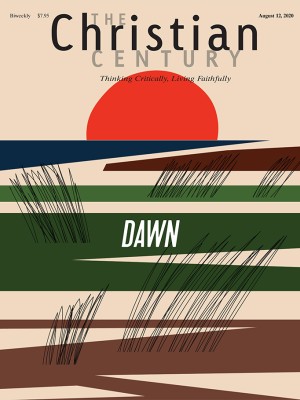August 30, 22A (Matthew 16:21-28)
Following Jesus means the human things and the divine things will overlap.
When I taught sixth-grade language arts, I used a set of diagrams called graphic organizers to help my students organize their thoughts. We used Venn diagrams to compare and contrast, writing differences in the outside portions of the overlapping circles and similarities in the center where the two circles meet. To sort ideas into categories, we used a very simple kind of graphic organizer: two columns. One column might be titled “books of the Old Testament” and the other “books of the New Testament.” They’re mutually exclusive. The divisions are clear.
To confuse these columns, to put items meant for one column into the other, is to commit what philosopher Gilbert Ryle called a category mistake. If you’ve mentally sorted bats into the category “birds,” for example, you might waste a lot of time searching for their feathers.
Read our latest issue or browse back issues.
Most of the time, category mistakes result in mere confusion, not in loud condemnations from the Son of God. But poor Peter! Mere moments after Jesus praises him as a star pupil, the foundation from which every generation of believers will be built, Peter messes up in grand fashion. He refuses to believe that Jesus’ ministry will end with betrayal and crucifixion, and he begs Jesus not to speak of such nonsense anymore. Jesus lights into him, accusing the rock of being a stumbling block. “You are setting your mind not on divine things,” Jesus tells him, “but on human things.”
One column for divine, one for human. Peter is sure he knows what goes in the “divine” column. Soaring prayers in immaculate temples, for instance. Unstoppable strength and miraculous power. Radiant glory and endless ease. Surely, these are the qualities of the Messiah; surely, aiming toward these spotless ideals will bring disciples closer to God. And in the “human” column? That’s where grief and pain belong; that’s where conflict and brokenness should go. All the grittiness and sorrow of this world: that’s what human must mean.
But Jesus’ sharp rebuke shows how wrong Peter is. In his attempt to protect his beloved teacher, Peter makes a category mistake, swapping the titles at the top of the two columns. It turns out that Peter’s daydreams of the divine are, instead, human things: our own projection of who God is. Like Peter, we imagine a God who is remote and magical, invincible and impeccable. A God far removed from our concerns, perpetually triumphant. This is not the God revealed by and in Jesus: instead, it’s a work of our human imagination.
Jesus calls us, instead, to define divine things differently. As Jesus names them, divine things include the experiences of betrayal and hypocrisy, the pain of suffering and death, and submission to resurrection mystery outside our control and beyond our understanding. The hardest and lowest things, the inescapable realities of human life: by paradox, these are actually the most divine.
To understand God, to set our aim true, we must grasp incarnation: not only in its adorable Christmas swaddling clothes but also here on the road to Jerusalem. We must cope with the scandalous truth that in Christ, God enters into every mean and awful thing, so that what seems like the worst of our world might be the very places where we meet the most holy.
And since Jesus goes before us into these rough divine places, we might follow him there, knowing that we do not go alone. We can pick up a cross, feeling a weight across our shoulders and splinters in the palms of our hands, knowing that we are not the first nor the only ones to carry it. We can lose the lives we’ve known, with their glib answers and careful plans, and find a new life over which we have no control, trusting that Jesus too went forward on a way full of peril and mystery. We follow him not out of masochistic delight in pain, nor from a grim abstinence from comfort. Instead, we risk sacrifice and trouble because we trust that God is present in these divine things—and that the life we find there will be the only life worth having.
Not long after this exchange with Peter, Jesus offers his disciple a still different perspective, inviting him to come along on a hike up a mountaintop. At the summit, Peter suddenly sees Jesus more powerfully transfigured than even his old imaginings could have dreamed. His Savior shines, radiant and bright. The great heroes of the faith surround him. God’s own voice comes like a thunderclap from heaven. The vision does not last; it cannot last—work awaits down the mountain. But for just a moment, the thick line between the divine and human columns blurs.
It turns out that to tell the story of Jesus, the best graphic organizer might not be shaped like two columns after all. Instead, we need the Venn diagram, where human things and divine things can overlap. In that doubled circle, we find glory and suffering, power and vulnerability, death and new life. We find the one who tells us to set our mind on what’s divine, knowing that what’s most divine is also most human.






